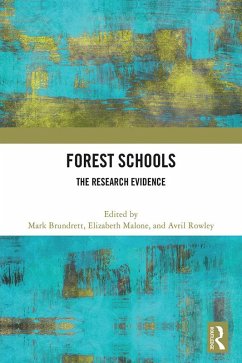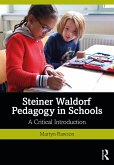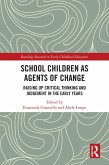Forest Schools (eBook, PDF)
The Research Evidence
Redaktion: Brundrett, Mark; Rowley, Avril; Malone, Elizabeth
52,95 €
52,95 €
inkl. MwSt.
Sofort per Download lieferbar

26 °P sammeln
52,95 €
Als Download kaufen

52,95 €
inkl. MwSt.
Sofort per Download lieferbar

26 °P sammeln
Jetzt verschenken
Alle Infos zum eBook verschenken
52,95 €
inkl. MwSt.
Sofort per Download lieferbar
Alle Infos zum eBook verschenken

26 °P sammeln
Forest Schools (eBook, PDF)
The Research Evidence
Redaktion: Brundrett, Mark; Rowley, Avril; Malone, Elizabeth
- Format: PDF
- Merkliste
- Auf die Merkliste
- Bewerten Bewerten
- Teilen
- Produkt teilen
- Produkterinnerung
- Produkterinnerung

Bitte loggen Sie sich zunächst in Ihr Kundenkonto ein oder registrieren Sie sich bei
bücher.de, um das eBook-Abo tolino select nutzen zu können.
Hier können Sie sich einloggen
Hier können Sie sich einloggen
Sie sind bereits eingeloggt. Klicken Sie auf 2. tolino select Abo, um fortzufahren.

Bitte loggen Sie sich zunächst in Ihr Kundenkonto ein oder registrieren Sie sich bei bücher.de, um das eBook-Abo tolino select nutzen zu können.
Interest in Forest Schools has seen a phenomenal rise in recent years around the Globe with thousands of children now experiencing this new context for learning. Forest Schools have also provided a new focus for researchers to find out more about the opportunities and benefits that can be derived from this specific form of outdoor learning.
- Geräte: PC
- mit Kopierschutz
- eBook Hilfe
- Größe: 12.01MB
Andere Kunden interessierten sich auch für
![History, Theory and Practice of Philosophy for Children (eBook, PDF) History, Theory and Practice of Philosophy for Children (eBook, PDF)]() History, Theory and Practice of Philosophy for Children (eBook, PDF)44,95 €
History, Theory and Practice of Philosophy for Children (eBook, PDF)44,95 €![Steiner Waldorf Pedagogy in Schools (eBook, PDF) Steiner Waldorf Pedagogy in Schools (eBook, PDF)]() Martyn RawsonSteiner Waldorf Pedagogy in Schools (eBook, PDF)26,95 €
Martyn RawsonSteiner Waldorf Pedagogy in Schools (eBook, PDF)26,95 €![School Children as Agents of Change (eBook, PDF) School Children as Agents of Change (eBook, PDF)]() School Children as Agents of Change (eBook, PDF)41,95 €
School Children as Agents of Change (eBook, PDF)41,95 €![Young Adolescents and the Middle Schools They Need (eBook, PDF) Young Adolescents and the Middle Schools They Need (eBook, PDF)]() Dave F. BrownYoung Adolescents and the Middle Schools They Need (eBook, PDF)41,95 €
Dave F. BrownYoung Adolescents and the Middle Schools They Need (eBook, PDF)41,95 €![The British Betrayal of Childhood (eBook, PDF) The British Betrayal of Childhood (eBook, PDF)]() Al Aynsley-GreenThe British Betrayal of Childhood (eBook, PDF)20,95 €
Al Aynsley-GreenThe British Betrayal of Childhood (eBook, PDF)20,95 €![Creative Readings of Multilingual Picturebooks (eBook, PDF) Creative Readings of Multilingual Picturebooks (eBook, PDF)]() Creative Readings of Multilingual Picturebooks (eBook, PDF)42,95 €
Creative Readings of Multilingual Picturebooks (eBook, PDF)42,95 €![The Toxic Classroom (eBook, PDF) The Toxic Classroom (eBook, PDF)]() Richard StewardThe Toxic Classroom (eBook, PDF)18,95 €
Richard StewardThe Toxic Classroom (eBook, PDF)18,95 €-
-
-
Interest in Forest Schools has seen a phenomenal rise in recent years around the Globe with thousands of children now experiencing this new context for learning. Forest Schools have also provided a new focus for researchers to find out more about the opportunities and benefits that can be derived from this specific form of outdoor learning.
Dieser Download kann aus rechtlichen Gründen nur mit Rechnungsadresse in A, B, BG, CY, CZ, D, DK, EW, E, FIN, F, GR, HR, H, IRL, I, LT, L, LR, M, NL, PL, P, R, S, SLO, SK ausgeliefert werden.
Produktdetails
- Produktdetails
- Verlag: Taylor & Francis eBooks
- Seitenzahl: 238
- Erscheinungstermin: 12. Februar 2025
- Englisch
- ISBN-13: 9781040314067
- Artikelnr.: 72680427
- Verlag: Taylor & Francis eBooks
- Seitenzahl: 238
- Erscheinungstermin: 12. Februar 2025
- Englisch
- ISBN-13: 9781040314067
- Artikelnr.: 72680427
- Herstellerkennzeichnung Die Herstellerinformationen sind derzeit nicht verfügbar.
Mark Brundrett is Professor Emeritus at Liverpool John Moores University, UK, and Executive Editor of Education 3-13, International Journal of Primary, Elementary and Early Years Education. Elizabeth Malone is Reader in Education, Pedagogy and Citizenship, Manchester at Metropolitan University, UK, and Editor of Education 3-13, International Journal of Primary, Elementary and Early Years Education. Avril Rowley is Senior Lecturer in Primary Education at Liverpool John Moores University, UK.
Introduction 1. The Forest School impact on children: reviewing two decades
of research 2. Reviewing two decades of research on the Forest School
impact on children: the sequel 3. Does engagement in Forest School
influence perceptions of risk, held by children, their parents, and their
school staff? 4. Fostering children's relationship with nature: exploring
the potential of Forest School 5. 'Sometimes there are rules about what
girls can do': a rights-based exploration of primary-aged children's
constructions of gender in Forest School 6. Encounters with Forest School
and Foucault: a risky business? 7. Learning outdoors: the Forest School
approach 8. The place of forest school within English primary schools:
senior leader perspectives 9. Practitioners' perspectives on children's
engagement in Forest School 10. Challenges and pedagogical conflicts for
teacher-Forest School leaders implementing Forest School within the UK
primary curriculum 11. Footprints in the woods: 'tracking' a nursery child
through a Forest School session 12. Forest School in an inner city? Making
the impossible possible 13. A bird's eye view: comparing young children's
play in Forest School in England with Forest Kindergarten in Denmark 14.
'Wow! Is that a birch leaf? In the picture it looked totally different': a
pragmatist perspective on deep learning in Norwegian 'uteskole' 15. A
balancing act: a constructivist perspective of the adult's role in Forest
School in England and Forest Kindergarten in Denmark 16 The importance of
recognising and promoting independence in young children: the role of the
environment and the Danish Forest School approach
of research 2. Reviewing two decades of research on the Forest School
impact on children: the sequel 3. Does engagement in Forest School
influence perceptions of risk, held by children, their parents, and their
school staff? 4. Fostering children's relationship with nature: exploring
the potential of Forest School 5. 'Sometimes there are rules about what
girls can do': a rights-based exploration of primary-aged children's
constructions of gender in Forest School 6. Encounters with Forest School
and Foucault: a risky business? 7. Learning outdoors: the Forest School
approach 8. The place of forest school within English primary schools:
senior leader perspectives 9. Practitioners' perspectives on children's
engagement in Forest School 10. Challenges and pedagogical conflicts for
teacher-Forest School leaders implementing Forest School within the UK
primary curriculum 11. Footprints in the woods: 'tracking' a nursery child
through a Forest School session 12. Forest School in an inner city? Making
the impossible possible 13. A bird's eye view: comparing young children's
play in Forest School in England with Forest Kindergarten in Denmark 14.
'Wow! Is that a birch leaf? In the picture it looked totally different': a
pragmatist perspective on deep learning in Norwegian 'uteskole' 15. A
balancing act: a constructivist perspective of the adult's role in Forest
School in England and Forest Kindergarten in Denmark 16 The importance of
recognising and promoting independence in young children: the role of the
environment and the Danish Forest School approach
Introduction 1. The Forest School impact on children: reviewing two decades
of research 2. Reviewing two decades of research on the Forest School
impact on children: the sequel 3. Does engagement in Forest School
influence perceptions of risk, held by children, their parents, and their
school staff? 4. Fostering children's relationship with nature: exploring
the potential of Forest School 5. 'Sometimes there are rules about what
girls can do': a rights-based exploration of primary-aged children's
constructions of gender in Forest School 6. Encounters with Forest School
and Foucault: a risky business? 7. Learning outdoors: the Forest School
approach 8. The place of forest school within English primary schools:
senior leader perspectives 9. Practitioners' perspectives on children's
engagement in Forest School 10. Challenges and pedagogical conflicts for
teacher-Forest School leaders implementing Forest School within the UK
primary curriculum 11. Footprints in the woods: 'tracking' a nursery child
through a Forest School session 12. Forest School in an inner city? Making
the impossible possible 13. A bird's eye view: comparing young children's
play in Forest School in England with Forest Kindergarten in Denmark 14.
'Wow! Is that a birch leaf? In the picture it looked totally different': a
pragmatist perspective on deep learning in Norwegian 'uteskole' 15. A
balancing act: a constructivist perspective of the adult's role in Forest
School in England and Forest Kindergarten in Denmark 16 The importance of
recognising and promoting independence in young children: the role of the
environment and the Danish Forest School approach
of research 2. Reviewing two decades of research on the Forest School
impact on children: the sequel 3. Does engagement in Forest School
influence perceptions of risk, held by children, their parents, and their
school staff? 4. Fostering children's relationship with nature: exploring
the potential of Forest School 5. 'Sometimes there are rules about what
girls can do': a rights-based exploration of primary-aged children's
constructions of gender in Forest School 6. Encounters with Forest School
and Foucault: a risky business? 7. Learning outdoors: the Forest School
approach 8. The place of forest school within English primary schools:
senior leader perspectives 9. Practitioners' perspectives on children's
engagement in Forest School 10. Challenges and pedagogical conflicts for
teacher-Forest School leaders implementing Forest School within the UK
primary curriculum 11. Footprints in the woods: 'tracking' a nursery child
through a Forest School session 12. Forest School in an inner city? Making
the impossible possible 13. A bird's eye view: comparing young children's
play in Forest School in England with Forest Kindergarten in Denmark 14.
'Wow! Is that a birch leaf? In the picture it looked totally different': a
pragmatist perspective on deep learning in Norwegian 'uteskole' 15. A
balancing act: a constructivist perspective of the adult's role in Forest
School in England and Forest Kindergarten in Denmark 16 The importance of
recognising and promoting independence in young children: the role of the
environment and the Danish Forest School approach







